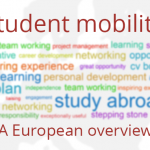 Still writing on MOOCs while, in a previous newsletter, I explained how the term disappeared in the United States? Am I waisting your time (and mine)?
Still writing on MOOCs while, in a previous newsletter, I explained how the term disappeared in the United States? Am I waisting your time (and mine)?
Try searching the Educause 2015 reports, using this word as a a keyword: itwill return only a couple of papers!
Yes, the word seems to disappear but I declare that MOOCs are still alive and live very well. They are just hidden under other wordings.
The leaders of American universities, whom I had the chance to meet last November at EDUCAUSE 2015, doubt that the initiatives of some universities, like ASU or Champaign, to validate MOOCs certifications in their own curriculum, will be generalized. For most American universities MOOCs are mostly another use, a by-product, of online courses first thought for internal use as SPOCs. Whenever an institution can afford the development of an online course, offering it as a MOOC, opened to the general public, does not cost much and serves as a vehicle for communication.
I had the opportunity on several occasions to explain that building a MOOC is expensive and that it must be used by hundreds of students to recover the investment. If we take only this factor into account, MOOCs would be restrained to the bachelor levels, mainly the college, where classes are crowded. No MOOCs for master levels or for specialized studies! MOOCs being an excellent communication product, the expenditure could be partially allocated to the communication line in the budget of the institutions but there is no hope to recover for the cost of development of all the MOOCs.
In short, the massive use of MOOCs and their avatars, SPOCs and other online courses, is a great idea to change the pedagogy but only for the richs. It is not with the declining budget of most European universities today that we could see encouraging signs of a rapidly changing pedagogy in our institutions.
Not at all! A group of universities, all around the world, is showing us the right way. They have decided to pool their efforts together. This announcement comes from Inside Higher Ed this month.
TU Delft in the Netherlands, ETH Zürich (member of EUNIS) in Switzerland, ANU in Australia, Boston U. in the United States, University of Queensland and University of British Columbia in Canada have decided to pool their efforts and to integrate in their curriculum the best MOOCs of their partners. Students of the consortium will be able to follow online courses, among a selected set of about 200 MOOCs, and to credit the corresponding ECTS in their own institution. All MOOCs built by these universities will not necessarily be selected by the consortium. Their quality, the number of ECTS they represent must be approved by all.
This is probably the most important news, in the world of MOOCs, in the recent past, and may be much more:
- MOOCsare integrated in universities curriculumsas they are. I mean theyare not played separately for internal use in different universitieswith a tutoringas it is the case for SPOCsbutplayed, at the same time, for the general public. Some AmericanuniversitiesalreadyemployMOOCsto attract newstudents,as mentioned before, but this is the first timethat MOOCs are offered to the students, inside a normal curriculum, to enlarge the offer and possible subjects.
- Cooperationis taking placeat an international scaleand thiswill probably lead toaform of internationalizationof qualifications.
- And, most importantly, these universities remain master ofthe gameby buildingtogether theircatalog withtheir own products.They are able tooffer a variety of high quality courses andMOOCs will be ameans, as any other,to acquireparts of aMOOCs enter officially in the curricula of official institutions.
The ultra-liberal vision of the early times, when some perceived MOOCs as a way to reduce labor costs in universities in the most developed countries, failed long ago. Others nowadays (see Campus Technology) foresee the end of the universities, as we know them, and believe that nanodegrees and other forms of skills, accumulated all around then exposed through LinkedIn, will replace diplomas certified by institutions recognized by the State.
Today’s newsisgood newsin that itshows that it ispossible to combinean opening towardsother universitiesand that newforms of learningcan be conceived retaining the guaranteesthat onlyaccreditedinstitutions can offer.
Would the MOOC become one of the hopes of our universities for their future?










